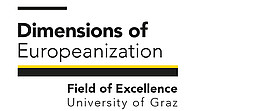Mentoring Concept
In order to secure high quality standards of research, the mentoring relationship is based on two pillars: the mentoring triangle and the partnership agreement.
Mentoring Triangle
The PhD program is built on a triangle mentoring system. The triangle consists of two faculty members in Graz as first and second mentor, and one mentor from an external research institution. In exceptional cases where specific external continuous expertise is needed, there is a possibility that the mentoring triangle could include, besides the first mentor in Graz, two external mentors. The program encourages a research stay at the institution of the external mentor to provide for the opportunity of consultations and research. In addition, external mentors are invited to the University of Graz for lectures, workshops, and seminars. Their selection will reflect the interdisciplinary nature of the research project; thus the two mentors from the University of Graz will have different disciplinary backgrounds. By developing contacts and establishing a mentoring system with one mentor outside of Graz, PhD students can rely not only on cooperation with international University partners of the program, but also on the support of existing academic networks and the cooperation of all core faculty and faculty associated members. PhD students spend at least six months outside of Graz for fieldwork and/or at a partner institution with their external mentor.
Partnership Agreement
The mentoring relationship is regulated with a partnership agreement that is made between each PhD student and the main adviser as well as in a modified form between the student and the two other advisers. The agreement has two chapters: a) working program, and b) commitments. Each PhD student and mentor defines the working program together given the following question structure: What are the mutual expectations of the student and the mentor? What are the research goals? How will the goals be achieved? How often will meetings be held and at which phase of the project? What are the concrete research tasks, work packages, and milestones for each semester/month? What is the overall detailed research project plan? When and how will mutual feedback take place, including improvement strategies? The student and adviser formulate this agreement considering the following areas: the mentor encourages the PhD student to establish autonomous, open, and innovative scientific research, offer support in the process of thesis-writing as well as one article for peer-review journal, and is open for consultations based on the PhD student’s need. The overall progress of the student is discussed in regular meetings with faculty members (at least twice per semester) and students present their research prospectus during the first three semesters in a doctoral seminar to fellow doctoral PhD students and faculty members, as well as at least one progress report following field work.
Speaker
Florian Bieber
Zentrum für Südosteuropastudien
Schubertstraße 21/I, 8010 Graz




